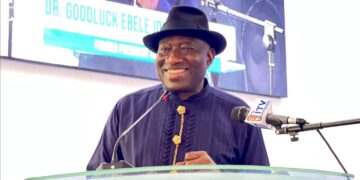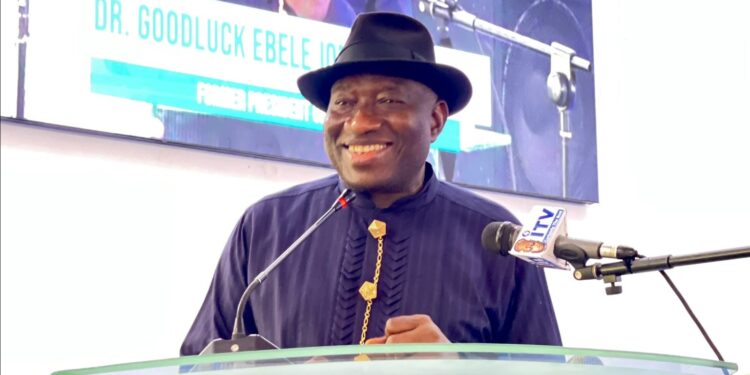By Enyichukwu Enemanna
Former President of Nigeria, Goodluck Jonathan has urged the National Assembly to consider a brand of democracy that will suit the country, emphasising that winner-takes-all approach politics, which alienates other parties, irrespective of performance at the polls, is inimical to efforts to foster unity in the African country.
The former Nigerian leader who lost his bid for re-election in 2015 to the opposition candidate Muhammadu Buhari, described it as embarrassing, the series of litigations that trail virtually every electoral cycle in the country.
“The avalanche of litigations that follow every round of election in Nigeria is very embarrassing. And because of the kind of democracy with practice, democracy built on all kinds of sentiments, either way you worship your God or from the map of the country you come from”, Jonathan who conceded defeat before the final announcement of the 2015 presidential poll said on Tuesday in Abuja at a Democracy Day lecture to celebrate the 25th Anniversary of Democracy in Nigeria.
“You people have to gradually make sure that in the next 25 years, this is diluted if we must have a solid and enduring democracy.
“And I know you and the President Bola Ahmed Tinubu who was a key actor in the June 12 crisis will have the capacity to navigate through that process.
“The zero sum kind of politics, where a winner takes it all has not helped is to foster unity and political justice. A political party for example, that scored up to 30% of votes during an election either at the National or sub National level should have something to go home with”, Jonathan who was a governor of oil-rich Bayelsa stated.
Heritage Times HT reports that Jonathan was the first incumbent President to be defeated in an election in Nigeria and he shunned the norm of embarking on a legal tussle to challenge the electoral outcome.
He was hailed for the courage, a move that has attracted global accolade, putting him at the forefront in election observation missions across Africa and the world at large.
He believes that the National Assembly can come up with a democracy model that can suit Nigeria, a 250 million population that has enjoyed a relatively stable democracy since 1999.
There has however been concerns of marginalization of some regions, with South East leaders insisting that the region has not had a fair share of power since return of democracy.
“I’m not clearly recommending proportional representation but different governments come up with models of democracy that suits them. After all, the presidency we’re talking about, all presidents of the world don’t emerge through the same process. In Nigeria, we elect our president directly. In a number of countries, presidents are elected indirectly.
“The powers of the presidents are defined by different constitutions and so on and so forth. So our National Assembly can also look at models that will suit us”, he advised.




































